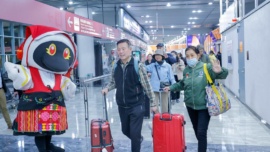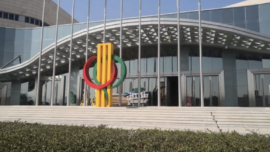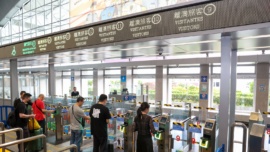Local businessmen and companies have to take more risks and get out of their comfort zone like their Mainland counterparts in order to establish businesses in Portuguese-speaking countries, the President of the Angola Businessmen’s Confederation (CEA), Francisco Viana, told Business Daily.
Mr. Viana made the remarks on the sidelines of the Angola, Guangdong and Macau Trade and Investment Forum held yesterday at the 22nd Macau International Fair (MIF).
“Macau business spirit is changing and a change of attitude is essential because until now local businessman have had a comfort zone that is hard to get out of, while Mainland entrepreneurs take more risks and go for it,” he added.
However, Mr. Viana considered that although currently Macau’s role in Sino-Luso business relations was more “political and institutional” he was seeing more local companies in sectors such as information technologies that could adopt a more proactive role.
MAIN GUEST
As this year’s MIF main partner country, Angola has brought a delegation of 50 companies and over 800 entrepreneurs, with neighbouring Guangdong bringing a delegation of 250 people.
In yesterday’s forum the Vice-Governor of Guangdong, Chen Yunxian, stated that in 2016 imports and exports between the Chinese province and Portuguese-speaking countries totalled US$9.2 billion (MOP73.93 million).
In the first eight months of this year, Angola was China’s second largest Lusophone trading partner after Brazil, with bilateral trade between the two countries increasing 47.77 per cent yearly to US$15.06 billion.
“Between January and August of this year trade between Angola and Guangdong reached US$520 million, a 110 per cent increase yearly which [reflects] the level of trade between the regions,” Mr. Chen stated.
The CEA President told Business Daily that although his delegation was not planning to sign agreements in this year’s MIF, the event would serve to prepare future structural agreements between Angola and the Greater Bay Area.
These agreements will be focused on establishing industrial parks in Luanda for Guangdong companies; protocols between universities in Macau, Guangdong and Angola; and establishing a direct route between Guangzhou and Luanda.
BUILDING UP
According to Mr.Viana a co-operation agreement is being prepared between the China Council for the promotion of international trade Guangdong Committee (CCPIT) and the CEA of the construction of a large industrial park with 2,000 hectares named the Luanda-Guangdong Business park in the Viana Special Economic Zone, where Guangdong companies could set up.
Future protocols would also seek to establish a 150,000 hectares agriculture business condominium for agriculture companies and a 200-hectare Recycle Business Park for the recycling sector.
Previously, African country representative at the Forum for Economic and Trade Co-operation between China and Portuguese-speaking Countries (Forum Macao), Belarmino Barbosa, stated the country’s bank BIC had requested MSAR authorities open a local branch, with Mr. Viana stating the deal was still being negotiated.
“We intend to bring African and Lusophone banks with a presence in Africa to co-operate with Chinese banks. They know the market and can be an advantage for Chinese businessmen. Regardless of Mainland China’s financial power, financial co-operation shouldn’t just include Chinese banks but also banks from Portuguese-speaking countries,” he added.
RESHUFFLE AND DEAL
According to the business delegation leader, the lack of concrete agreements signed in this year’s MIF was due to “rushed preparations” and the reshuffling in government created by the recent Presidential elections in the country.
However, Mr. Viana stated that with Angola the third largest country in terms of Chinese direct investment, new President João Manuel Gonçalves would attempt to tackle some issues of lack of transparency, monopolisation and corruption that had occurred in the past, with the country’s investment ecosystem becoming “more transparent and up to international standards”.
“We’re looking to develop selective investment in the manufacturing sector and the services that support it, so agriculture, mining, fishing, food production, minerals, wood, infrastructure for health, energy, harbours and other essential structures for economic development,” Mr. Viana added.























